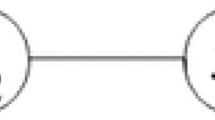Abstract
This paper generalizes the multilinear game where the payoff tensor of each player is fixed to the generalized multilinear game where the payoff tensor of each player is selected from a nonempty set of tensors. We prove the existence of \(\varepsilon \)-Nash equilibria for generalized multilinear games under the assumption that all involved sets of tensors are bounded, and the existence of Nash equilibria for generalized multilinear games under the assumption that all involved sets of tensors are compact. In particular, when all involved sets of tensors are finite, we show that finding a Nash equilibrium point for the generalized multilinear game is equivalent to solving a vertical tensor complementarity problem, and establish a one-to-one correspondence between the Nash equilibrium point of the game and the solution of the vertical tensor complementarity problem.
Similar content being viewed by others
References
Aumann, R.J., Hart, S.: Handbook of Game Theory With Economic Applications. North-Holland, Amsterdam (1992)
Basar, T., Olsder, G.J.: Dynamic Noncooperative Game Theory, 2nd edn. Academic Press, San Diego (1995)
Bomze, I.M.: Non-cooperative two-person games in biology: a classification. Int. J. Game Theory 15(1), 31–57 (1986)
Che, M., Qi, L., Wei, Y.: The generalized order tensor complementarity problems. Numer. Math. Theor. Meth. Appl. 13(1), 131–149 (2020)
Chen, C., Zhang, L.: Finding Nash equilibrium for a class of multi-person noncooperative games via solving tensor complementarity problem. Appl. Numer. Math. 145, 458–468 (2019)
Cottle, R.W., Dantzig, G.B.: A generalization of the linear complementarity problem. J. Comb. Theory. 8(1), 79–90 (1970)
Cottle, R.W., Pang, J.S., Stone, R.E.: The Linear Complementarity Problem. Academic Press, Boston (1992)
Dutta, A., Das, A.K.: Homotopy continuation method for discounted zero-sum stochastic game with ARAT structure. Int. Game Theory Rev. 25(03), 1–18 (2023). https://doi.org/10.1142/S0219198923400042
Facchinei, F., Kanzow, C.: Generalized Nash equilibrium problems. Ann. Oper. Res. 175, 177–211 (2010)
Facchinei, F., Pang, J.S.: Finite-Dimensional Variational Inequalities and Complementarity Problems. Springer, New York (2003)
Gowda, M.S., Sznajder, R.: A generalization of the Nash equilibrium theorem on bimatrix games. Int. J. Game Theory 25(1), 1–12 (1996)
Han, J.Y., Xiu, N.H., Qi, H.D.: Nonlinear Complementarity Theory and Algorithm. Shanghai Science and Technology Press, Shanghai (2006). ((in Chinese))
Howson, J.T., Jr.: Equilibria of polymatrix games. Manage. Sci. 18(5), 312–318 (1972)
Hu, M., Fukushima, M.: Existence, uniqueness, and computation of robust Nash equilibrium in a class of multi-leader-follower games. SIAM J. Optim. 23, 894–916 (2013)
Huang, Z.H., Qi, L.: Formulating an \(n\)-person noncooperative game as a tensor complementarity problem. Comput. Optim. Appl. 66(3), 557–576 (2017)
Huang, Z.H., Qi, L.: Tensor complementarity problems - part I: basic theory. J. Optim. Theory Appl. 183(1), 1–23 (2019)
Huang, Z.H., Qi, L.: Tensor complementarity problems - part III: applications. J. Optim. Theory Appl. 183(3), 771–791 (2019)
Kolda, T.G., Bader, B.W.: Tensor decompositions and applications. SIAM Rev. 51(3), 455–500 (2009)
Lemke, C.E.: Bimatrix equilibrium points and mathematical programming. Manage. Sci. 11(7), 681–689 (1965)
Lemke, C.E., Howson, J.T., Jr.: Equilibrium points of bimatrix games. SIAM J. Appl. Math. 12(2), 413–423 (1964)
Lloyd, N.: Degree Theory. Cambridge University Press, Cambridge (1978)
Mangasarian, O.L., Stone, H.: Two-person nonzero-sum games and quadratic programming. J. Math. Anal. Appl. 9, 348–355 (1964)
Meng, R., Huang, Z.H., Wang, Y.: Existence of the least element solution of the vertical block \(Z\)-tensor complementarity problem. Optim. Lett. 17, 1697–1709 (2023)
Mohan, S.R., Neogy, S.K.: Generalized linear complementarity in a problem of \(n\)-person games. OR Spektrum. 18, 231–239 (1996)
Nash, J.F.: Equilibrium points in \(N\)-person games. Proc. Natl. Acad. Sci. 36, 48–49 (1950)
Nash, J.F.: Non-cooperative games. Ann. Math. 54(2), 286–295 (1951)
Ortega, J.M., Rheinboldt, W.C.: Iterative Solution of Nonlinear Equations in Several Variables. Academic Press, New York (1970)
Osborne, M.J., Rubinstein, A.: A Course in Game Theory. The MIT Press, London (1994)
Peng, J.M., Lin, L.: A non-interior continuation method for generalized linear complementarity problems. Math. Program. 86, 533–563 (1999)
Qi, H.D., Liao, L.Z.: A smoothing Newton method for extended vertical linear complementarity problems. SIAM J. Matrix Anal. Appl. 21(1), 45–66 (1999)
Qi, L., Huang, Z.H.: Tensor complementarity problems - part II: solution methods. J. Optim. Theory Appl. 183(2), 365–385 (2019)
Rosenmüller, J.: On a generalization of the Lemke-Howson algorithm to noncooperative \(n\)-person games. SIAM J. Appl. Math. 21(1), 73–79 (1971)
Acknowledgements
The authors wish to express the gratitude to the associate editor and referees for their valuable comments and advice. The authors were partially supported by the National Natural Science Foundation of China (Grant Nos. 12171357 and 12371309)
Author information
Authors and Affiliations
Corresponding author
Additional information
Communicated by Francesco Zirilli.
Publisher's Note
Springer Nature remains neutral with regard to jurisdictional claims in published maps and institutional affiliations.
Rights and permissions
Springer Nature or its licensor (e.g. a society or other partner) holds exclusive rights to this article under a publishing agreement with the author(s) or other rightsholder(s); author self-archiving of the accepted manuscript version of this article is solely governed by the terms of such publishing agreement and applicable law.
About this article
Cite this article
Jia, Q., Huang, ZH. & Wang, Y. Generalized Multilinear Games and Vertical Tensor Complementarity Problems. J Optim Theory Appl 200, 602–633 (2024). https://doi.org/10.1007/s10957-023-02360-8
Received:
Accepted:
Published:
Issue Date:
DOI: https://doi.org/10.1007/s10957-023-02360-8
Keywords
- Multi-person noncooperative game
- \(\varepsilon \)-Nash
- Nash equilibrium point
- Vertical tensor complementarity problem
- Degree theory



